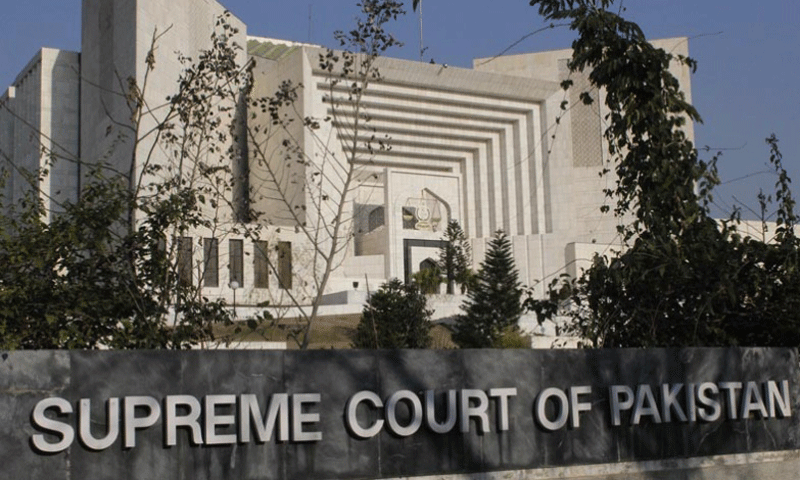Pakistan's top court resumes hearing Article 63-A review with new bench
SC replaces Justice Munib Akhtar with Justice Nadeem Akhtar Afghan a day after former recused from hearing the case citing multiple concerns

Aamir Abbasi
Editor, Islamabad
Aamir; a journalist with 15 years of experience, working in Newspaper, TV and Digital Media. Worked in Field, covered Big Legal Constitutional and Political Events in Pakistan since 2009 with Pakistan’s Top Media Organizations. Graduate of Quaid I Azam University Islamabad.

AFP
CJ Isa assures transparency, says, 'no closed doors in the Supreme Court'
Apex court adjourns hearing till tomorrow
Pakistan’s top court resumed hearing today the Article 63-A defection review with a new bench. A day earlier it had put off the hearing following the recusal of one of the judges on the five-member bench.
Following arguments, the Supreme Court (SC) adjourned the hearing of the review plea until tomorrow. The petition related to defections or ‘floor-crossing’ of parliamentary lawmakers is being seen as critical for the ruling alliance, which is making significant efforts to pass a controversial constitutional package.
The bench, headed by Chief Justice Qazi Faez Isa, heard the petition with Justice Nadeem Akhtar Afghan replacing Justice Munib Akhtar. The other judges on the bench included justices Aminuddin Khan, Jamal Khan Mandokhail, and Mazhar Alam Khan Miankhel.
A day earlier, Justice Akhtar had declined to hear the appeal over multiple concerns. In a letter, he disputed the judges’ committee that formed the bench. He also disagreed with the inclusion in the bench of an ad hoc judge - Justice Mazhar Alam Khan Miankhel.
What is Article 63-A and why is it significant
Article 63-A, added to the constitution in 2010, refers to 'floor-crossing' or defection in the assembly.
It reads: “If a member of a Parliamentary Party comprised of a single political party in a House votes or abstains from voting in the House contrary to any direction issued by the Parliamentary Party to which he belongs, in relation to (i) election of the Prime Minister or the Chief Minister or (ii) a vote of confidence or a vote of no-confidence or (iii) a Money Bill or a Constitution (Amendment) Bill, he may be declared in writing by the Party Head to have defected from the political party and the Party Head may forward a copy of the declaration to the Presiding Officer and the Chief Election Commissioner and shall similarly forward a copy to the member concerned.”
This aims to restrict the lawmakers of their voting powers by binding them to the decision of their ‘party head’. The constitution clearly states that the penalty for violating Article 63-A is the disqualification of a lawmaker from the assembly and the vacating of their seat in case of defection.
What happened in court today
At the start of the hearing, Chief Justice Qazi Faez Isa explained that Justice Munib Akhtar had declined to rejoin the bench, and Justice Mansoor Ali Shah – a member of the judges’ committee - also refused to partake in forming the bench.
As a result, Justice Naeem Akhtar Afghan was added to the larger bench. The CJ assured transparency, stating, "There are no closed doors in the Supreme Court. The bench is complete; let’s proceed."
At this, Pakistan Tehreek-e-Insaf’s (PTI) Barrister Ali Zafar objected. CJ Isa told him to wait his turn, noting that the filer of the review petition had the right to argue first.
Following this, Supreme Court Bar Association Shahzad Shaukat began by outlining the case, which involved a presidential reference and petitions under Article 184(3). The Chief Justice clarified that the jurisdiction of the two matters was distinct, as a presidential reference only seeks legal opinions, not court decisions.
When asked, Shaukat confirmed that Arif Alvi was president at the time and read out Article 63-A. The Chief Justice questioned the legal questions raised by the president, to which Shaukat responded that the president sought clarity on betrayal under Article 63-A, with the court labeling deviation from party policy as a "cancer."
Justice Isa intervened, asking Shaukat to focus on the facts, questioning the use of the term "cancer" and the issue of disqualification for defecting members. Shaukat confirmed that disqualification was left to the party head. Justice Isa then asked how anything extra could be added to the Constitution if it was clear.
The Additional Attorney General confirmed that while defecting votes wouldn’t be counted, the decision didn’t mandate disqualification. The Chief Justice noted that if defecting votes aren’t counted, Article 95 is rendered ineffective and questioned why Parliament still needs to pass the budget. Shaukat expressed objections to the majority decision.
Justice Isa pointed out that the matter of disqualification is up to the party head, and compared it to political developments in Balochistan and the UK. He then asked whether the decision on Article 63-A contradicted Articles 95 and 136, to which Shaukat affirmed it did.
The chief justice adjourned the hearing, with the remaining arguments scheduled for the next day.






Comments
See what people are discussing